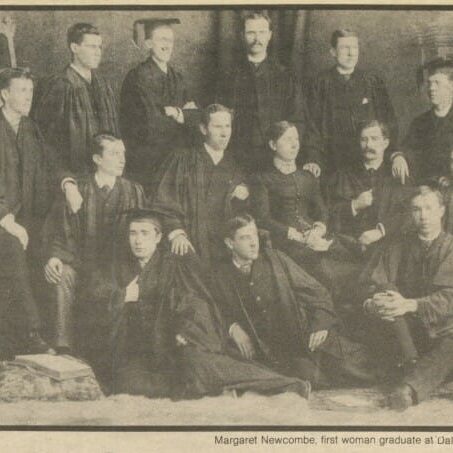
Tuesday March 8th is International Women’s Day. While the tumultuous past year has exposed many of the ongoing challenges facing women on campus, would-be optimists might take heart in a campus history that has witnessed the slow but determined march of women’s progress, even in the face of daunting social and structural barriers. Women have come a long way at Dalhousie since the Gazette was founded—from not even being allowed to enroll, to composing 55% of the student population as of the latest statistics. The excerpts that follow highlight some of the significant milestones in the history of women at Dalhousie, as reported by the Gazette.
“Miss Muffet’s Letter” – Volume 9, Issue 10 – March 31, 1877
DEAR GAZETTE,
SEEING a remark of yours to the effect that you never allowed a lady’s letter to waste its sweetness in the waste basket, we’ve ventured to send you a girl’s opinion on “Woman’s Right to College Training.”
Rev. Malachi pleads ably for an educated ministry, and surely we may raise our small voice for an educated womanhood. (We are aware that it is strong proofs and not a loud voice that convict.) It is a fact, now generally known, that women are the mothers of the human race–as such they have important duties to perform–the highest entrusted to human agency.
Let the machinery, that is to do the work, be wrought to the highest degree of perfectness. Don’t leave the girls’ minds in the rough. Shape them for their various ends while yet those ends are in prospective. A woman’s sphere is at home; then let her home stores be full that she may have something to draw from. It is unfair in you men to keep us in ignorance because we are not the strongest half. We think, with Thackeray, “It is by persons believing themselves in the right that nine-tenths of the tyranny in this world is committed.” There are too many wives like Copperfield’s Dora–and mothers too. Let us have a few more Agnes’. Tennyson’s words are too often true:
“She knows but matters of the house,
And he, he knows a thousand things.”
This needn’t be so. ” Union is strength.” Students of Dal–band together: stretch out the hand; take the girls in, welcome us as if not as men and brothers–as women and nearly equals.
We believe in the theory that there are souls masculine and souls feminine put into bodies without regard to sex. You gents will never be told “you are only a girl, education will make you strong-minded.”
We will bear this, if we get the one woman’s right–sound education. You would cut us all out by nice little patterns and say you must be this, walk so, talk so, look so. You don’t like “strong-minded” ladies: nor, do we. It is possible to reconcile strength, grace, and beauty. We like Shakespeare’s portrait–”What makes her fairness much the fairer was, it was the ambassadress of a most fair mind.”
There’s our ideal. Perhaps what you most “most prize in woman is her affection not her intellect.” That won’t suffer. ‘Twill be cultivated if we get our small foot in Dal–. Some of you do try to form the female mind. “I’ve heern tell on” one of your Sophs. trying to educate a gushing maid during the Summer vacation by way of experiment; talked to her on subjects, gave books, mirrors of his most fair intellect, in hopes of her catching the reflections. The result is left to time. Educate us en masse. The student “with his watery smile and educated whisker” wouldn’t have such trouble in the Summer teaching after “Grade C,” if we had a Collegiate training. If we have said too much, pity and forgive.
“Let not the mouse of our good meaning
Be snapped up by the trap of our suspicion,
To lose the tail there, either of its truth
Or swallowed by the cat of misconstruction.”
Yours,
MISS MUFFET.
“Editorial” – Volume 9, Issue 10 – March 31, 1877
(…)
What earthly reason could be given why ladies should not attend the classes as they are conducted at Dalhousie ?
None whatever,–that is to say, none but prejudice; and it will require considerable authority to make this appear to young and ardent minds a sufficiently good one. It is time it were dissipated. Universities are tremendously conservative, yet we hope that in this instance our authorities will be able to clear the dust and scales of venerable antiquity from their eyes, and look at the matter in the light of present necessity and practical utility. After the novelty gets once worn off–which will take about three weeks–it will be found that the change has really been very slight after all. The novelty is the main objection to the movement, but it will have to be met some time, and may as well now as in future.
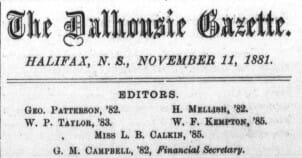
The Gazette’s First Female Editor, Miss Lillie B. Calkin – Volume 14, Issue 1 – November 11, 1881
“A Talk of College and Ladies’ Rights” – Volume 35, Issue 7 – March 7, 1903
(…)
Whether or not the atmosphere of the Atlantic coast is conducive to greater liberality of thought and breadth of mind, Dalhousie was one of the first of the colleges to admit women. In fact, they might have entered vears before they did; for when the first application came for the admission of a girl, and the senate gathered in solemn conclave, it was found that there was nothing in the constitution to debar any lady capable of entering. This was announced in the press, and applications poured in. It was evident that the students were amicably disposed to the invasion. In early issues of the GAZETTE the question is discussed with very good reasons pro.
(…)
Despite the great number of applications, only two ladies had courage to enter. In the fall of 1881, Miss Margaret Newcombe and Miss Lilian Calkin were enrolled as full undergraduates. Both were Munro bursars. Miss Calkin did not complete her course; but Miss Newcombe graduated with honour in English and English History in 1885. Miss Calkin was the first lady editor of the GAZETTE. In the year 1886, Amelia Stewart graduated as B. Sc., with Honours in Pure and Applied Mathematics. Miss Stewart afterward won a fellowship at Bryn Mawr. Next year, 1887, there were three girl graduates, two B. A.’s and a B.L. The latter was Miss Eliza Ritchie, who graduated with High Honours in Philosophy, gained the degree of Ph.D. from Cornell, and was for several years professor of Philosophy at Wellesley College.
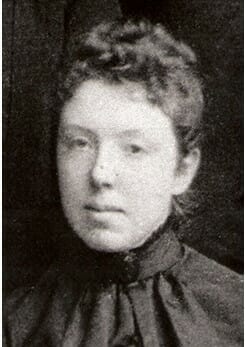
“Annie Isabella Hamilton”
“Med Corner” – Volume 85, Issue 29 – February 3, 1953
Of all the professions perhaps Medicine more than any other has historically been considered a man’s responsibility, but even Medicine wasn’t immune to the virulent creature- Woman- and in 1849 the first woman in modern times obtained her medical degree and became the pioneer and leader for over fifty years of women in Medicine. ·(…)
In 1893 Annie Hamilton graduated as Dalhousie’s first woman physician and aroused both horror and amusement as she rode around her practice in the North End of this city in divided skirts on a bicycle. A fellow schoolmate describes her as being very plainly dressed, rather colorless, with straight thin hair, not very attractive. In fact, shortly after school opened the boys sent a paper around the class to get her one of the affairs the other girls wore—a bustle. (…)
And so I could continue down through the years, but the story would be the same, a picture of courage and faith, a life of humility and service to others. Dr. Nichols in her closing remarks has expressed this challenge: “Surely these early countrywomen and colleagues of mine, having obtained a good report through faith, received not the promise”- but have left to us now in the medical profession, “seeing we also are compassed about with so great a cloud of witnesses,” an incentive, “to lay aside every weight and run with patience the race that is set before us.”
“What College does to Girls” — Co-Ed Issue — Vol 62, Issue 6 — November 8, 1929
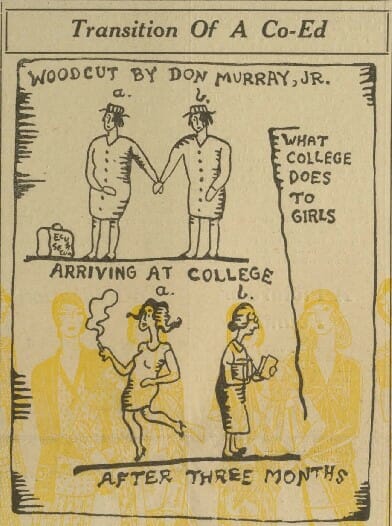
“What College does to Girls” — Co-Ed Issue — Vol 62, Issue 6 — November 8, 1929
“First Woman Graduate” – Volume 91, Issue 5 – November 1958
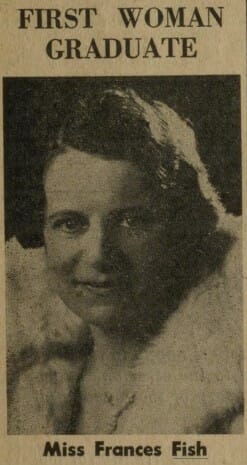
“Winners Move In” – Bill Mitchell – Volume 117, Issue 25 – March 21, 1985
WITH THE LARGEST Majority since 1982, Catherine Blewett and Reza Rizvi were elected Dalhousie Student Union president and vice-president executive. Blewett is also the first woman president.
(…)
Although Blewett is to be the first woman DSU president, she does not envisage any changes as a result.
“I don’t think that’s relevant. I can’t think what will change or why it should.” She savs she and Rizvi are going to concentrate on a response to the Nova Scotia Royal Commission’s report on education.
“Breaking Ground” – Donna Lee – Volume 131, Issue 25 – April 8, 1999
Noni MacDonald didn’t think her new job would make her a ground-breaker.
“It’s been called ·medical history’,” she chuckled. “[It’s] kind of a surprise that everybody’s so interested.”
MacDonald, who will become Dalhousie’s new Dean of Medicine in time for the next school year, is the first woman in Canada to hold such a position.
“I realized I would be the first woman dean of medicine,” she said, “but I didn’t realize that was a big deal.”
But as more people talked with her following her appointment, she realized she was breaking a ‘glass ceiling’ that had been holding women in medicine back. “It’s very sad that it’s 1999 before the first woman dean of medicine in Canada has been appointed. There have been women in academic medicine for a long time.”
“It is a big deal, and I am much more respectful of that now, because I have a better understanding having talked to a lot of women … they have said, ‘you are providing a leadership model for people.”
But while everyone else is focussing on her gender, her attention is squarely on her new job. During her five-year term as dean, MacDonald says she plans to lead Dal’s medical school towards overall excellence.







